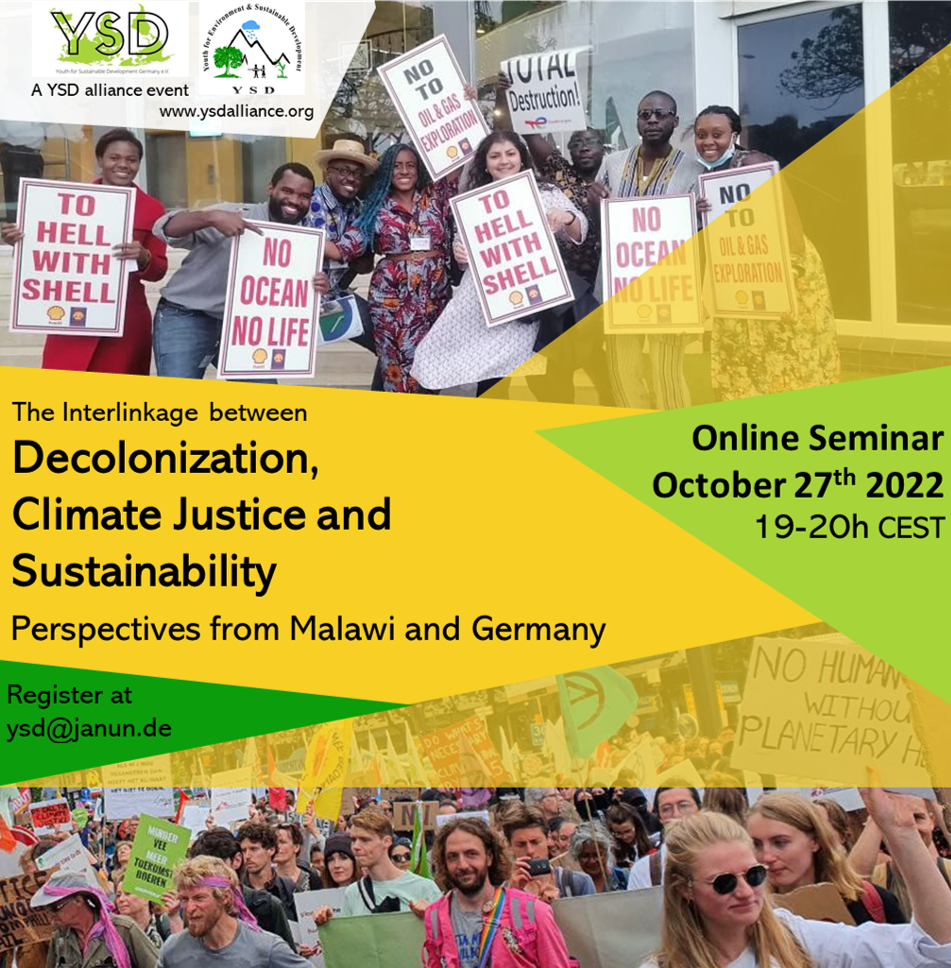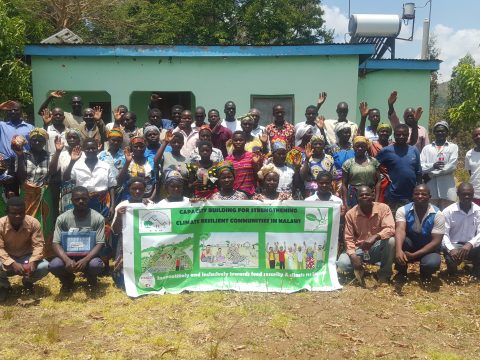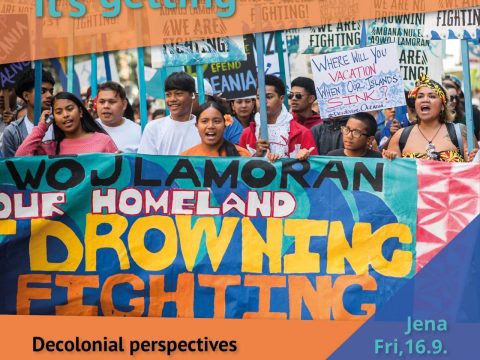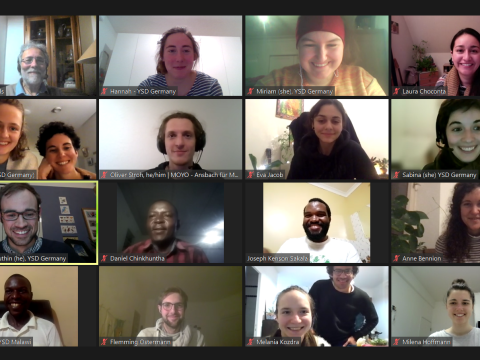Webinar October 27, 2022: The interlinkage between Decolonialization, Climate Justice and Sustainability – Perspectives from Malawi and Germany

Seminar: Klimagerechtigkeit in einer post-1.5°C Welt /Climate justice in a 1.5°C world. Jena 16.-18. September 2022
September 1, 2022
Online event: Community-centered Climate Resilience. Join us April 20th online!
April 16, 2023The interlinkage between Decolonialization, Climate Justice and Sustainability
- Perspectives from Malawi and Germany A webinar by YSD alliance The climate justice movement strives towards a livable present and future for all. Yet, the impacts of the climate crisis are interlinked with colonial power structures. Exploitation of people and resources in the Global South at the benefit of societies in the Global North, such as fossil fuel extraction, causes dramatic local damage and fuels global warming and environmental breakdown across the planet. Impacts of the climate crisis in turn disproportionately affect the Global South while the Global North is responsible for most emissions [1]. Indigenous communities are often at the frontlines of fighting against fossil fuel extraction and 80% of biodiversity [2] is safeguarded by indigenous peoples. However, indigenous knowledge is largely disregarded or actively attacked. In our cooperation as a climate justice group active in Malawi and Germany, we are already noticing the consequences of the climate crisis: small scale farmers YSD Malawi is working with witness the effects of droughts at increasing intensities and after Malawi was hit by several cyclones, the power supply suffered long-term damage. In Germany, we feel the consequences of failing climate policies with each successive heat wave, drought and flood disaster. Meanwhile, talk about national security interests instead of global solidarity is increasing in the context of Corona and war. Further, colonial patterns in minds and institutions deeply affect climate policy and negotiations, as well as our movement itself. Creativity is needed to envision what global solidarity means in this context and how it looks like in practice. In the webinar we want to exchange perspectives on actions and strategies of the climate movement in Germany and in Malawi, reflect on how to build a global community with a decolonial mindset to work on the common good of climate justice, and empower each other to make a difference. The event will take place online on zoom in English. In Malawi an additional live session is organized prior to the webinar at Bunda College, Lilongwe. To register please write to ysd@janun.de and we will send you the link to the online event. The program will be from 7 to 8 pm (CEST) on Thursday October 27th. Afterwards the zoom room will stay open for possible further discussion until around 8.30 pm. [1] https://ourworldindata.org/contributed-most-global-co2
[2] https://www.nationalgeographic.com/environment/article/can-indigenous-land-stewardship-protect-biodiversity-
- Perspectives from Malawi and Germany A webinar by YSD alliance The climate justice movement strives towards a livable present and future for all. Yet, the impacts of the climate crisis are interlinked with colonial power structures. Exploitation of people and resources in the Global South at the benefit of societies in the Global North, such as fossil fuel extraction, causes dramatic local damage and fuels global warming and environmental breakdown across the planet. Impacts of the climate crisis in turn disproportionately affect the Global South while the Global North is responsible for most emissions [1]. Indigenous communities are often at the frontlines of fighting against fossil fuel extraction and 80% of biodiversity [2] is safeguarded by indigenous peoples. However, indigenous knowledge is largely disregarded or actively attacked. In our cooperation as a climate justice group active in Malawi and Germany, we are already noticing the consequences of the climate crisis: small scale farmers YSD Malawi is working with witness the effects of droughts at increasing intensities and after Malawi was hit by several cyclones, the power supply suffered long-term damage. In Germany, we feel the consequences of failing climate policies with each successive heat wave, drought and flood disaster. Meanwhile, talk about national security interests instead of global solidarity is increasing in the context of Corona and war. Further, colonial patterns in minds and institutions deeply affect climate policy and negotiations, as well as our movement itself. Creativity is needed to envision what global solidarity means in this context and how it looks like in practice. In the webinar we want to exchange perspectives on actions and strategies of the climate movement in Germany and in Malawi, reflect on how to build a global community with a decolonial mindset to work on the common good of climate justice, and empower each other to make a difference. The event will take place online on zoom in English. In Malawi an additional live session is organized prior to the webinar at Bunda College, Lilongwe. To register please write to ysd@janun.de and we will send you the link to the online event. The program will be from 7 to 8 pm (CEST) on Thursday October 27th. Afterwards the zoom room will stay open for possible further discussion until around 8.30 pm. [1] https://ourworldindata.org/contributed-most-global-co2
[2] https://www.nationalgeographic.com/environment/article/can-indigenous-land-stewardship-protect-biodiversity-



